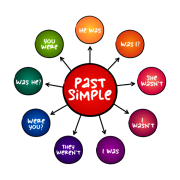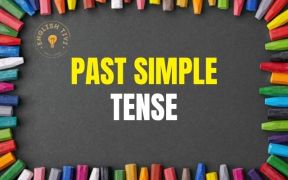Différences entre versions de « Simple Past »
| Ligne 205 : | Ligne 205 : | ||
{{@}} '''Examples of common difficulties in understanding or interpreting''': | {{@}} '''Examples of common difficulties in understanding or interpreting''': | ||
| − | |||
*'''[[Difficulty with past time markers]]''': Learners often struggle to identify or use appropriate time markers like *yesterday*, *last year*, or *two days ago*. Without these markers, sentences in the simple past can be unclear or contextually ambiguous. | *'''[[Difficulty with past time markers]]''': Learners often struggle to identify or use appropriate time markers like *yesterday*, *last year*, or *two days ago*. Without these markers, sentences in the simple past can be unclear or contextually ambiguous. | ||
| Ligne 243 : | Ligne 242 : | ||
Souhaitez-vous approfondir l’un de ces points ou obtenir des conseils pédagogiques pour les aborder ? | Souhaitez-vous approfondir l’un de ces points ou obtenir des conseils pédagogiques pour les aborder ? | ||
{{@}} '''Potential confusions or semantic shifts''': | {{@}} '''Potential confusions or semantic shifts''': | ||
| − | *'''[[Simple | + | *'''[[Simple Past - Present Perfect]]''': Learners frequently confuse these tenses because both refer to actions in the past. However, the **simple past** emphasizes a completed action at a specific time in the past (e.g., *I visited Paris last year*), while the **present perfect** highlights the relevance or experience of an action without focusing on when it occurred (e.g., *I have visited Paris*). This misunderstanding often arises when time markers are absent or unclear. |
| + | *'''[[Simple Past - Past Continuous]]''': The confusion lies in distinguishing between a completed action in the past and an action that was ongoing at a specific moment in the past. For example, learners may say, *I was read a book last night* instead of *I read a book last night*. The **past continuous** is better suited for describing background actions (e.g., *I was reading when the phone rang*). | ||
| + | |||
| + | *'''[[When - While]]''': Students often misuse these conjunctions when describing past events. **When** introduces a specific, completed action (e.g., *I heard a noise when I opened the door*), whereas **while** sets up a longer, ongoing action (e.g., *I was cooking while he was cleaning*). Misunderstanding their roles can lead to illogical or grammatically incorrect sentences. | ||
| + | |||
| + | *'''[[Used to - Simple Past]]''': Learners confuse habitual actions in the past with single completed actions. For example, they may say, *I played soccer every day* when they mean *I used to play soccer every day*. This results in a loss of clarity about whether the action was repetitive or one-time. | ||
| + | |||
| + | *'''[[Verbs Regular - Verbs Irregular]]''': Students sometimes default to adding "-ed" to all verbs, leading to errors like *eated* instead of *ate*. This stems from a lack of familiarity with irregular verb conjugations or overgeneralization of rules. | ||
| + | |||
| + | *'''[[Auxiliary "did" - Affirmative and Negative Sentences]]''': A frequent error involves omitting the auxiliary *did* in negatives and questions (e.g., *She didn’t worked* instead of *She didn’t work*). This confusion arises from the difference in how tense is marked in affirmative versus negative and interrogative forms. | ||
*'''[[Verbes réguliers - Verbes irréguliers]]''' : Les élèves tendent à appliquer uniformément la règle d’ajout de "-ed" pour conjuguer au simple past, oubliant que certains verbes suivent des règles spécifiques (ex. *goed* au lieu de *went*). Cette erreur découle d’une mémorisation insuffisante des verbes irréguliers. | *'''[[Verbes réguliers - Verbes irréguliers]]''' : Les élèves tendent à appliquer uniformément la règle d’ajout de "-ed" pour conjuguer au simple past, oubliant que certains verbes suivent des règles spécifiques (ex. *goed* au lieu de *went*). Cette erreur découle d’une mémorisation insuffisante des verbes irréguliers. | ||
Version actuelle datée du 11 décembre 2024 à 19:10
 Traduction
Traduction
Passé simple (Français) / Simple past (Anglais) / الماضي البسيط (Arabe) / Pretérito simple (Espagnol) / Passado simples (Portugais) / Простое прошедшее время (Russe) / Passato semplice (Italien) / Präteritum (Allemand) / 一般过去时 (Chinois (Mandarin)) / साधारण भूतकाल (Hindi) / 単純過去 (Japonais) / সরল অতীত কাল (Bengali) / Past simpel (Néerlandais) / Simples passado (Grec)
 Définition
Définition
Domaine, Discipline, Thématique
Définition écrite
- The simple past (or past simple) tense in English is used to describe actions or events that were completed in the past. It is essential for indicating that an action occurred at a specific point in time, often specified with time markers like *yesterday*, *last week*, *in 2020*, or *two days ago*.
Affirmative Form:
- For regular verbs, the simple past is formed by adding -ed to the base form of the verb (e.g., *worked*, *played*).
- Irregular verbs, however, have unique past forms (e.g., *went*, *saw*).
Negative Form:
- The negative form uses the auxiliary verb did not (or *didn’t*) followed by the base form of the main verb (e.g., *did not work*, *didn't go*).
Interrogative Form:
- Questions in the simple past begin with Did, followed by the subject and the base form of the main verb (e.g., *Did you work?*, *Did he go?*).
This tense is widely used in English to narrate past events, describe historical facts, and provide background for actions completed at specific times in the past.
|
Applications and Nuances of the Simple Past
1. Completed Actions in the Past: The simple past describes actions that took place at a specific moment in the past, with no connection to the present. Example: “*She visited London last year.*” 2. Past Habits: It can describe repetitive actions or habits in the past, often with expressions like *always*, *often*, *never*. Example: “*They always walked to school.*” 3. Narratives and Sequences of Events: This tense is often used in narratives to describe a series of actions in chronological order, providing structure to the storyline. Example: “*He entered the room, turned on the light, and sat down.*” 4. Hypotheticals or Unreal Conditions in Conditional Sentences: In conditional type 2 sentences, the simple past is used to indicate hypothetical or unreal situations. Example: “*If I had more time, I would travel more.*” 5. Specific or Extended Events: The simple past can indicate singular events (e.g., “*I saw him yesterday*”) or prolonged states that lasted in the past (e.g., “*They lived in France for ten years*”). |
Définition graphique
 Concepts ou notions associés
Concepts ou notions associés
 Exemples, applications, utilisations
Exemples, applications, utilisations
|
* Illustrating completed actions in a historical timeframe: *Example*: *She visited Paris last summer.* *Rationale*: This use highlights events that occurred and concluded at a specific time in the past. * Structuring narrative discourse through sequences: *Example*: *He woke up early, prepared breakfast, and left for work.* *Rationale*: This function is pivotal in storytelling to establish a chronological flow of events. * Depicting habitual practices or recurring behaviors in the past: *Example*: *They always played football after school.* *Rationale*: This emphasizes regular activities or patterns that existed in a prior temporal context. * Situating actions within specified temporal parameters: *Example*: *I met him in 2018.* *Rationale*: This application anchors an action to a defined point in time for clarity and precision. * Employing time expressions to frame temporal specificity: *Example*: *We arrived two hours ago.* *Rationale*: This demonstrates how time markers enhance the contextual understanding of past actions. * Constructing negations to invalidate past occurrences: *Example*: *She did not (didn't) attend the meeting yesterday.* *Rationale*: This use allows for the expression of events that definitively did not take place. * Eliciting information about past events through inquiry: *Example*: *Did you see the movie last night?* *Rationale*: This structure facilitates the retrieval of specific information regarding past actions. |
 Erreurs ou confusions éventuelles
Erreurs ou confusions éventuelles
![]() Examples of common difficulties in understanding or interpreting:
Examples of common difficulties in understanding or interpreting:
- Difficulty with past time markers: Learners often struggle to identify or use appropriate time markers like *yesterday*, *last year*, or *two days ago*. Without these markers, sentences in the simple past can be unclear or contextually ambiguous.
- Overgeneralization of regular verb rules: Students tend to apply the "-ed" rule universally, leading to errors like *goed* instead of *went*. This happens because they are unaware of or have not memorized irregular verb forms.
- Confusion with the present perfect: Many learners mix up the simple past with the present perfect, particularly in contexts where both could apply. For example, *I visited Paris* vs. *I have visited Paris*. The first specifies a completed action in the past, while the second refers to the experience itself.
- Errors in forming questions and negatives: Learners often forget to use the auxiliary *did* in questions or negatives, resulting in sentences like *He not went* instead of *He didn’t go* or *Did he went?* instead of *Did he go?*.
- Pronunciation of -ed endings: The varying pronunciations of the "-ed" ending (/t/, /d/, /ɪd/) can be confusing for learners, leading to mispronunciations or avoidance of the correct form. For example, *walked* pronounced incorrectly as */walk-ed/*.
- Interference from the mother tongue: Learners may translate directly from their native language, leading to incorrect constructions. For instance, in languages without auxiliary verbs, learners might omit *did* in negatives and questions.
- Misuse of when and while: Students may struggle to distinguish between *when* (used for short, specific actions) and *while* (used for ongoing actions). For example, they might say, *When I was cooking, he called* instead of *While I was cooking, he called*.
- Unclear context of completed actions: Learners sometimes use the simple past for habitual actions (e.g., *I played soccer* instead of *I used to play soccer*), which can cause confusion about whether the action was a one-time event or a repeated behavior.
- Difficulté avec les verbes irréguliers: Les élèves peuvent rencontrer des difficultés à mémoriser la liste des verbes irréguliers, en particulier ceux dont les formes ne suivent pas de règle logique (ex. "go" → "went").
- Omission des marqueurs temporels: Les apprenants omettent souvent d'utiliser des indicateurs temporels tels que "yesterday," "last week," ou "two days ago," ce qui peut rendre leur discours confus ou ambigu.
- Confusion entre verbes réguliers et irréguliers: Les élèves appliquent parfois la règle du "-ed" à tous les verbes, y compris les irréguliers (ex. "goed" au lieu de "went").
- Erreur de structure interrogative et négative: Ils ont tendance à oublier que l'auxiliaire "did" est nécessaire pour former les questions et les négations, ce qui conduit à des erreurs comme "He not went" au lieu de "He didn’t go."
- Omission du pronom sujet: En anglais, contrairement à d'autres langues, le pronom sujet ne peut pas être omis, mais les élèves débutants l'oublient souvent, par exemple, "Went to the park" au lieu de "I went to the park."
- Interférence de la langue maternelle: Les élèves peuvent traduire directement de leur langue maternelle, ce qui crée des constructions incorrectes ou des erreurs de temps.
- Confusion dans l’utilisation avec "when" et "while": Les apprenants ont souvent du mal à comprendre que "when" est utilisé pour des actions courtes dans le passé, tandis que "while" introduit des actions longues ou continues.
- Problèmes de prononciation des terminaisons -ed: La prononciation de "-ed" peut varier (/t/, /d/, ou /ɪd/), ce qui peut créer des malentendus ou des erreurs d'intonation.
- Incompréhension du contexte d’utilisation: Les apprenants utilisent parfois le simple past de manière inappropriée pour parler d’habitudes passées ou pour des actions qui continuent dans le présent, qui nécessitent plutôt "used to" ou le present perfect.
Souhaitez-vous approfondir l’un de ces points ou obtenir des conseils pédagogiques pour les aborder ?
![]() Potential confusions or semantic shifts:
Potential confusions or semantic shifts:
- Simple Past - Present Perfect: Learners frequently confuse these tenses because both refer to actions in the past. However, the **simple past** emphasizes a completed action at a specific time in the past (e.g., *I visited Paris last year*), while the **present perfect** highlights the relevance or experience of an action without focusing on when it occurred (e.g., *I have visited Paris*). This misunderstanding often arises when time markers are absent or unclear.
- Simple Past - Past Continuous: The confusion lies in distinguishing between a completed action in the past and an action that was ongoing at a specific moment in the past. For example, learners may say, *I was read a book last night* instead of *I read a book last night*. The **past continuous** is better suited for describing background actions (e.g., *I was reading when the phone rang*).
- When - While: Students often misuse these conjunctions when describing past events. **When** introduces a specific, completed action (e.g., *I heard a noise when I opened the door*), whereas **while** sets up a longer, ongoing action (e.g., *I was cooking while he was cleaning*). Misunderstanding their roles can lead to illogical or grammatically incorrect sentences.
- Used to - Simple Past: Learners confuse habitual actions in the past with single completed actions. For example, they may say, *I played soccer every day* when they mean *I used to play soccer every day*. This results in a loss of clarity about whether the action was repetitive or one-time.
- Verbs Regular - Verbs Irregular: Students sometimes default to adding "-ed" to all verbs, leading to errors like *eated* instead of *ate*. This stems from a lack of familiarity with irregular verb conjugations or overgeneralization of rules.
- Auxiliary "did" - Affirmative and Negative Sentences: A frequent error involves omitting the auxiliary *did* in negatives and questions (e.g., *She didn’t worked* instead of *She didn’t work*). This confusion arises from the difference in how tense is marked in affirmative versus negative and interrogative forms.
- Verbes réguliers - Verbes irréguliers : Les élèves tendent à appliquer uniformément la règle d’ajout de "-ed" pour conjuguer au simple past, oubliant que certains verbes suivent des règles spécifiques (ex. *goed* au lieu de *went*). Cette erreur découle d’une mémorisation insuffisante des verbes irréguliers.
- When - While : La confusion entre **"when"** et **"while"** provient de leur utilisation pour introduire des actions passées. **"When"** est utilisé avec des actions courtes ou instantanées (ex. *I was reading when he called*), tandis que **"while"** marque des actions longues ou continues (ex. *I was reading while he was cooking*). Les apprenants ont parfois du mal à choisir le connecteur approprié, ce qui peut entraîner des erreurs de logique.
- Auxiliaire "did" - Forme affirmative sans auxiliaire : Lors de la formation des phrases négatives ou interrogatives, certains élèves oublient l’auxiliaire "did" et modifient directement le verbe principal (ex. *She didn’t went* au lieu de *She didn’t go*). Cette confusion reflète un manque de maîtrise des structures grammaticales propres au simple past.
- Prononciation des terminaisons -ed - Absence de marque de passé : Certains élèves ne prononcent pas correctement les terminaisons "-ed" (/t/, /d/, /ɪd/), ou les omettent complètement, ce qui peut rendre leur discours ambigu (ex. *He walk to the store* au lieu de *He walked to the store*). Ces erreurs peuvent être amplifiées par des difficultés d’écoute ou des interférences de leur langue maternelle.
Souhaitez-vous approfondir l'une de ces confusions ou explorer des stratégies pédagogiques spécifiques pour les éviter ?
![]() Other frequent errors:
Voici d'autres confusions ou glissements de sens qui pourraient vous sembler intéressants et approfondir la réflexion sur l'enseignement du **simple past** :
Other frequent errors:
Voici d'autres confusions ou glissements de sens qui pourraient vous sembler intéressants et approfondir la réflexion sur l'enseignement du **simple past** :
- Simple past - Past continuous : Les apprenants confondent souvent ces deux temps lorsqu'ils parlent d'actions simultanées dans le passé. Le **simple past** décrit une action brève ou terminée (ex. *I heard a noise*), tandis que le **past continuous** décrit une action en cours au moment où une autre intervient (ex. *I was reading when I heard a noise*). Cette confusion peut compliquer la narration d'événements.
- Actions terminées - Habitudes passées ("used to") : Les élèves ont parfois du mal à distinguer entre une action ponctuelle terminée exprimée par le **simple past** (ex. *I visited my grandparents last weekend*) et des habitudes passées exprimées par "used to" (ex. *I used to visit my grandparents every weekend*). Ce glissement de sens peut rendre leur discours imprécis.
- Actions réelles - Actions imaginaires ("if" clauses) : La confusion surgit souvent lorsque les apprenants utilisent le **simple past** dans des phrases conditionnelles irréelles, pensant qu'il s'agit du passé réel (ex. *If I went to Paris, I would see the Eiffel Tower*). Ils peuvent mal interpréter cette structure comme une action réellement passée, alors qu’elle exprime une hypothèse.
- Simple past - Future in the past : Une difficulté subtile apparaît lorsqu'on enseigne des structures comme "was going to" (futur dans le passé) et que les élèves les confondent avec le **simple past**. Par exemple, *He said he was going to call me* peut être mal compris comme *He said he called me*, ce qui altère le sens.
- Action décrite - Résultat impliqué : Les apprenants peuvent parfois mal interpréter des phrases au **simple past** comme impliquant des résultats automatiques. Par exemple, *She worked hard* peut être pris comme une garantie de réussite, alors que le contexte pourrait indiquer autre chose.
Souhaitez-vous explorer l'un de ces points avec des exemples concrets, des activités pratiques ou des approches pédagogiques spécifiques pour éviter ces glissements de sens ?
 Questions possibles
Questions possibles
- What are the primary uses of the Simple Past tense?
- How do regular and irregular verbs differ in the Simple Past?
- What are some common time markers associated with the Simple Past?
- How do you form negative sentences in the Simple Past??
- What is the difference between the Simple Past and the Present Perfect?
- How do you ask questions using the Simple Past tense?
 Liaisons enseignements et programmes
Liaisons enseignements et programmes
Idées ou Réflexions liées à son enseignement
- Have students write and share short stories about their previous vacations or memorable events, focusing on using the Simple Past.
- Use pictures or timelines to help students visualize the sequence of events and understand the correct use of time markers (e.g., yesterday, last year, two days ago) to set the context for the Simple Past.
- Engage students in role-playing exercises where they talk about past experiences, such as describing a visit to a museum or recounting a memorable moment from a past event.
- Create interactive games (e.g., verb conjugation bingo or flashcards) where students match base verbs with their correct past tense forms.
- Have students work in pairs to review each other’s written work, focusing on identifying and correcting errors in the use of the Simple Past tense.
Education: Autres liens, sites ou portails
 Bibliographie
Bibliographie
Pour citer cette page: (Past)
ABROUGUI, M & al, 2024. Simple Past. In Didaquest [en ligne]. <http:www.didaquest.org/wiki/Simple_Past>, consulté le 22, décembre, 2024
- ..................
- ..................
- ..................
- ..................
- Pages utilisant des arguments dupliqués dans les appels de modèle
- Sponsors Education
- Grammaire (Concepts)
- Linguistique (Concepts)
- Apprentissage des langues (Concepts)
- Anglais (Concepts)
- Conjugaison (Concepts)
- Phonétique (Concepts)
- Rédaction en anglais (Concepts)
- Compréhension écrite (Concepts)
- Expression orale (Concepts)
- Tense usage (Concepts)
- Past Actions
- Time Markers
- Regular Verbs
- Irregular Verbs
- Completed Events
- Narratives
- Past Routines
- Affirmative Form
- Negative Form
- Interrogative Form
- Concepts
- Simple Past
- Simple Past (Concepts)
- Fiche conceptuelle didactique





